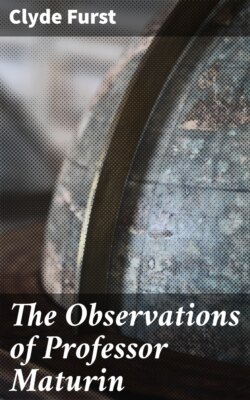Читать книгу The Observations of Professor Maturin - Clyde Bowman Furst - Страница 3
На сайте Литреса книга снята с продажи.
Introduction
ОглавлениеTable of Contents
IT was never my good fortune actually to meet Professor Maturin, or even to see him, although in the latter case I should instantly have recognized him, so familiar have I been through my mind’s eye, at least, with his personal appearance—his slender figure somewhat stooping with the bodily inclination of the scholar, the clear-cut features that could only have fitted his clear-cut mind, and the thoughtful eyes that were their necessary concomitant. I had known, of course, of his predilection for the Athenaeum, and his habit of dining at that club of intellectual and gastronomic repute, and I was aware of his membership in the veracious Sindbad Society whose meetings he frequently attended; but here, too, and principally from the fact, no doubt, that I was a member of neither, I had never been able to bring about the much desired personal acquaintance with him.
Of acquaintance, however, and even of a fairly satisfactory sort, there has nevertheless been no lack, for I have read much that Professor Maturin has written, and I have remembered, although inadequately enough, many of the things that he has said with such understanding and insight of the real bearing of individual experience, along quite extraordinarily extended lines, upon the wide problems of human existence.
It is so much the more a pleasure, accordingly, to me, and as it will be to all those who have read Professor Maturin before only sporadically and at intervals, at length to have the opportunity to read him consecutively, and thus to get those side-lights and reflections of understanding that can only come with a reasonable contiguity of statement.
In the present book, moreover, we shall be able to read the sayings of this philosopher of the cheerful mind as they have been remembered and recorded by one who, better than any one else at all, knew Professor Maturin as he thought, and as he spoke, and as he had his being. It is a record, as it will be very easy to discover, of one who has thought much and thought well, for there is a great difference, as we all know, in the quality as well as in the quantity of thinking. In it all there is an intellectual optimism that inevitably follows the thought wherever it roams—and it often roams far afield—which is one of the thrice blessed things of life. If through it all there runs, as again may clearly be seen, the visible thread of the conscious pursuit of happiness, Professor Maturin is no mere eudemonist whose belly is his god and whose goal is pleasure, but rather one who sees in the attainment of personal happiness the rightful accessory of a rounded and rational living. And with it all, and notwithstanding his calling, and in spite of the fact that he himself must have been conscious of an unusual knowledge which leads him at times even into the imperilled field of epigram, it is all done, not with a pedantic air of professorial sophistication, but with genuine human sympathy. And in this spirit he is commended to that wider circle of readers who are now to be able to know him.
William H. Carpenter
Columbia University February 14, 1916
